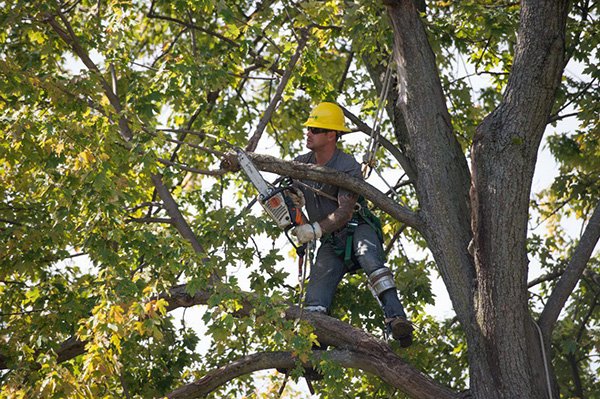
Tree trimming is an essential part of maintaining the health, safety, and aesthetic appeal of your property’s trees. In South Africa, the average cost of tree trimming can vary depending on several factors. Here’s a closer look at what you can expect to pay for this service.
Average Tree Trimming Costs
On average, tree trimming in South Africa costs between R150 and R250 per man-hour. This hourly rate covers the labor involved in trimming the branches and ensuring they are properly shaped and balanced.
However, the total cost of a tree trimming project can fluctuate based on factors such as the size of the tree, its location, and the extent of trimming required. For example, trimming a small to medium-sized tree typically ranges from R800 to R2,5004, while larger trees can cost upwards of R3,000 or more4.
How Much of a Tree Should You Trim?
When it comes to tree trimming, it’s important to strike a balance between maintaining the tree’s health and aesthetics while avoiding over-trimming. As a general rule, you should never remove more than 25% of a tree’s branches at one time2. Removing too much foliage can stress the tree and make it more susceptible to disease and pests.
The specific amount of trimming required will depend on the tree’s species, age, and overall condition. It’s best to consult with a certified arborist who can assess your tree and recommend the appropriate trimming techniques.
Trimming Palm Trees—how much does it cost?
Trimming palm trees is a specialized task that requires specific knowledge and equipment. The average cost to trim a palm tree in South Africa ranges from R200 to R300 per tree4. This price includes removing dead fronds, trimming the trunk, and cleaning up the debris.
It’s important to note that palm trees should be trimmed regularly, typically every 6 to 12 months, to maintain their health and appearance. Neglecting to trim palm trees can lead to issues such as frond breakage, disease, and even tree death.
Factors Influencing Tree Trimming Costs
Several factors can impact the cost of tree trimming services in South Africa:
– Tree size and height: Larger trees require more time and effort to trim, resulting in higher costs.
– Tree location: Trees located near power lines, buildings, or other obstacles may require additional safety precautions and specialized equipment, increasing the cost.
– Tree health and condition: Trees in poor health or with structural issues may require more extensive trimming, leading to higher costs.
– Debris removal: Some tree trimming services include debris removal, while others may charge an additional fee for this service.
– Accessibility: Trees that are difficult to access due to terrain or location may incur higher costs2.
Discounts and Special Pricing for Tree Trimming
Some tree trimming companies in South Africa offer discounts or special pricing for regular maintenance contracts. These contracts typically involve scheduled trimming at set intervals, such as annually or semi-annually. By signing up for a maintenance contract, you may be able to secure a lower hourly rate or a discounted package price.
It’s important to note that not all tree trimming companies offer discounts or special pricing, and the availability of these offers may vary depending on the region and the specific company.
What Are the Differences Between Urban vs. Rural Pricing?
Tree trimming prices in urban areas like Johannesburg tend to be higher than in more rural parts of South Africa4. This is due to several factors:
– Higher demand: Urban areas have a larger concentration of trees and a higher demand for tree trimming services, allowing companies to charge higher prices.
– Increased costs: Tree trimming in urban areas often requires additional safety precautions and specialized equipment to navigate around buildings, power lines, and other obstacles2.
– Labor costs: Urban areas typically have higher labor costs due to the cost of living and the demand for skilled workers.
Additional Tree Trimming Costs to Consider
When budgeting for tree trimming services, it’s important to consider additional costs beyond just the hourly rate for labor. These may include:
– Travel fees: Some tree trimming companies charge a travel fee for jobs located outside of their immediate service area.
– Equipment rental: If specialized equipment is required for the job, such as a bucket truck or crane, there may be an additional rental fee.
– Permits: Depending on the location and size of the tree, you may need to obtain a permit before trimming. The cost of the permit can vary depending on the municipality.
– Disposal fees: If the tree trimming company is responsible for disposing of the debris, there may be an additional fee for this service3.
DIY vs. Professional Tree Trimming
While it may be tempting to save money by trimming your trees yourself, it’s generally recommended to hire a professional tree trimming service. Here’s why:
– Safety: Tree trimming can be dangerous, especially when working with large trees or in tight spaces. Professional tree trimmers have the necessary training and equipment to ensure the job is done safely.
– Expertise: Certified arborists have specialized knowledge about tree health and proper trimming techniques. They can identify potential issues and recommend the best course of action for your trees.
– Liability: Professional tree trimming companies typically carry liability insurance, which protects you in case of property damage or personal injury during the job.
– Time and effort: Trimming trees can be time-consuming and physically demanding. Hiring a professional service saves you the time and effort of doing it yourself.
While DIY tree trimming may be a viable option for small, easily accessible trees, it’s generally not recommended for larger or more complex jobs. Hiring a professional tree trimming service ensures the job is done safely, efficiently, and in a way that promotes the long-term health of your trees.
